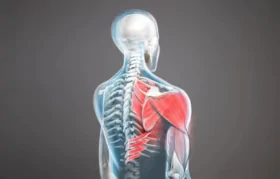Do you have Upper Back Pain that Radiates to Your Arms?
By Australiarxmeds, Jan-06-2024

When your upper back hurts, and the pain goes down your arm, it is usually due to a herniated disc or myofascial pain syndrome. A pinched nerve in your upper back can also make your arm ache. Knowing what is causing it is the first step to feeling better. Read on to learn more about why it happens and what you can do to get relief.
Upper left back pain can be caused by various factors, and understanding these causes is crucial for Finding Relief. Let us explore some common reasons for upper left back pain in simpler terms.
➳ Muscle Strain: Sometimes, lifting heavy things, overworking your shoulders, or making sudden awkward movements can strain the muscles in your upper left back, causing pain, spasms, and difficulty moving.
➳ Herniated Disc: When the soft disks between your spine’s bones tear or bulge due to repeated use or force, it is called a Herniated Disc. This can lead to upper back pain and other symptoms like leg pain, chest pain, and weakness.
➳ Scoliosis: Scoliosis is when your spine curves sideways. If the curve is to the left (levoscoliosis), it might not cause pain initially, but by middle age, back pain can develop.
➳ Spinal Stenosis: This is a narrowing of the spinal canal, often caused by bone spurs. If the narrowing puts pressure on nerves, you may feel pain on the left side of your back, along with other symptoms.
➳ Kyphosis: Kyphosis is an outward curve of the upper spine. While a mild curve usually does not cause symptoms, a severe curve can lead to pain in the lower and upper back, shoulder stiffness, and tingling in the legs.
➳ Vertebral Fracture: A fracture in the vertebrae of your spine, often occurring due to osteoporosis or accidents, can result in upper Back Pain, weakness, and numbness.
➳ Poor Posture: Having poor posture, where your spine and body are not aligned, can stress your back muscles and lead to one-sided upper back pain.
➳ Osteoarthritis: When the cartilage at the ends of your bones breaks down, it is called osteoarthritis. If this happens in your spine, you may experience upper back pain, stiffness, and poor flexibility.
➳ Myofascial Pain Syndrome: This condition creates sensitive trigger points in your muscles, causing aches and pains, especially in the trapezius muscle of your upper back. Pain O Soma 350 is a medication used to relieve pain and discomfort caused by muscle injuries or conditions.
➳ Pancreatitis: Inflammation of the pancreas can cause upper abdominal pain that radiates to the upper back. Symptoms may worsen after eating and include fever, nausea, and vomiting.
➳ Kidney Stone: When a kidney stone moves, it can cause dull one-sided pain in the upper abdomen, which may radiate to the upper back. Other symptoms include painful urination and nausea.
➳ Heart Attack: Though less common, a heart attack can cause chest pain that spreads to the upper back, along with symptoms like shortness of breath and fatigue.
If you are dealing with pain in your upper left back, and it is extending to your arm it is important to figure out why it is happening and how to make it better. Here is a simple guide to help you understand and address upper left back pain. Pain O Soma 500, is designed to provide relief from muscle pain and discomfort.
Diagnosing Upper Left Back Pain:

When you go to the doctor with upper left back pain, they will try to find out what is causing it. They will talk to you about your medical history and ask questions about your symptoms. The doctor will also do a physical exam, and sometimes they might recommend further tests like blood tests, X-rays, CT scans, MRIs, or EMG tests.
➳ Treatment for Upper Left Back Pain: The way to treat upper left back pain depends on what is causing it and your overall health.
➳ Over-the-Counter Pain Medication: Medicines like naproxen sodium or ibuprofen that you can buy without a prescription might help.
➳ Hot and Cold Packs: Putting a hot or cold pack on your back can make your muscles feel better. Aspadol 100 Mg alters the way the body perceives and responds to pain, improving the overall pain management experience.
➳ Light Physical Activity: Doing gentle exercises like walking or stretching can help with minor back pain. It is important to keep your muscles moving.
➳ Medical Treatment: If your back pain is really bad or does not go away, a doctor might suggest medical treatments.
➳ Prescription Medication: If over-the-counter medicine does not work, a doctor might give you stronger drugs or injections to help with the pain.
➳ Physical Therapy: A physical therapist can teach you exercises to make your back stronger. They might also use things like heat or electrical stimulation to help with the pain.
➳ Surgery: In rare cases, when there are structural issues like spinal stenosis, surgery might be needed.
➳ Specialized Procedures: For certain conditions like Kidney Stones, pancreatitis, or heart attacks, you might need specific treatments at a hospital.
When to See a Doctor:
Usually, small back pain gets better on its own. But if the pain is really bad, or it is not going away, or if you cannot move well because of it, you should see a doctor.
You Should Also Go To The Doctor If You Have:
◾ Numbness or Tingling: If your back pain is causing numbness or tingling, that’s a sign to see a doctor.
◾ Fever: If you have a fever along with back pain, it is a good idea to get medical help.
◾ Trouble Breathing: Difficulty breathing is a serious symptom, and you should seek medical attention.
◾ Unexplained Weight Loss: If you are losing weight without trying, it could be a sign of a more serious issue.
Conclusion:
Left-sided upper back pain may signal a spine, back, or organ issue. Simple remedies like OTC pain meds and hot packs help for minor pain, but Severe Pain may need prescription meds or therapy. If paired with fever or numbness, consult a doctor. Seek emergency help for serious injuries or difficulty breathing. Understanding these possible causes can help you identify the source of your Pain, allowing for proper care and relief. If you experience persistent or severe symptoms, consulting a medical professional is essential for accurate diagnosis and appropriate treatment.

